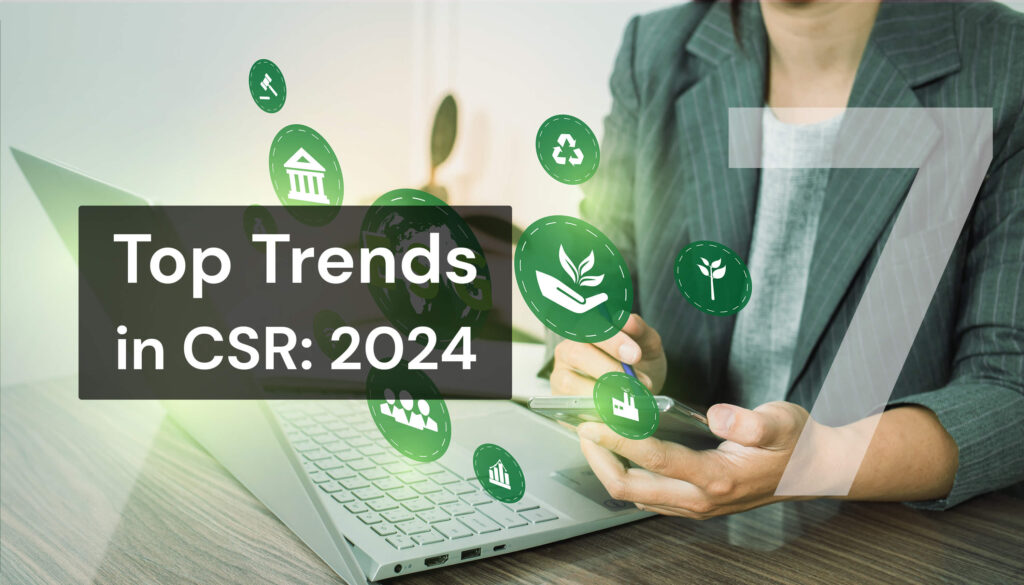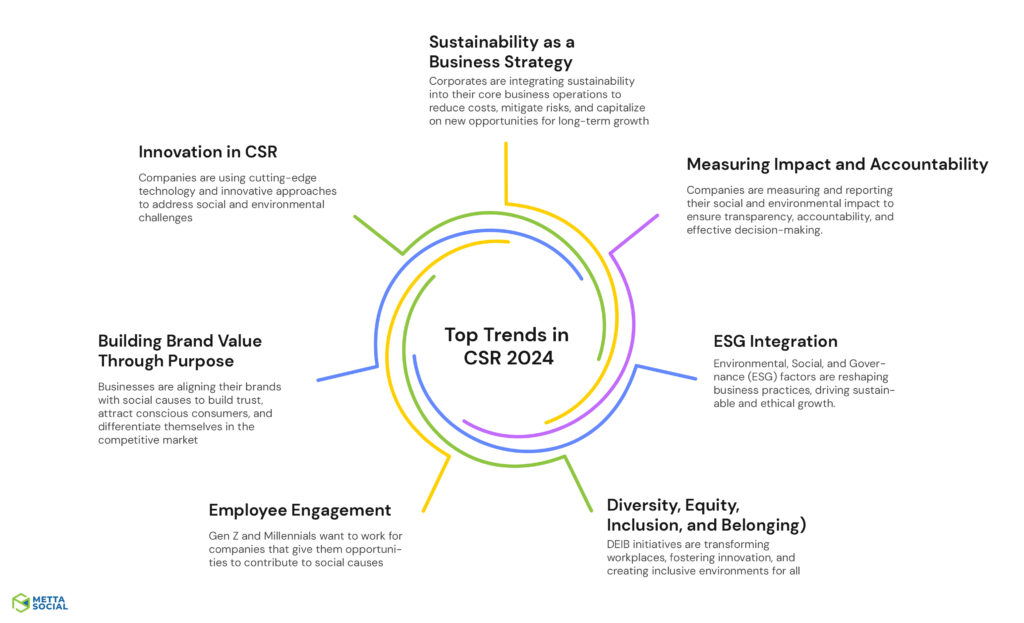CSR Top Trends in 2024

What is CSR?
Corporate Social Responsibility (CSR) is a company’s commitment to doing good for society while also running a successful business. It’s about giving back to the community, protecting the environment, and being a responsible neighbor. By taking these actions, companies can help create a healthier and more sustainable world.
As the world changes, CSR is continuing to evolve. Technology is playing a bigger role in helping companies measure their impact and find new ways to be sustainable. Global challenges like climate change and inequality are also driving companies to take more action. As we move into 2025, we can expect to see even more innovative and impactful CSR initiatives from businesses around the world.
The Need for Innovation in CSR
Companies today face challenges driven by stakeholder expectations, regulatory pressures, and global concerns such as climate change and social inequality. To stay ahead, innovation must become central to CSR strategies.
Technology offers significant advantages, helping companies not only meet regulatory standards but also create scalable, impactful solutions. Moreover, the need to adapt to emerging global challenges, including economic uncertainty and shifting environmental landscapes, requires CSR programs to be more agile, transparent, and measurable.
Let’s dive into some of the key trends that are reshaping CSR in 2024.

1. Employee Engagement
The Key to Attracting Top Talent – One of the biggest trends in CSR 2.0 is employee engagement. Today’s workforce, particularly Millennials and Gen Z, is looking for more than just a paycheck—they want to work for companies that share their values and give them opportunities to contribute to social causes.
Take Salesforce, for example. The tech giant’s 1-1-1 model (donating 1% of equity, 1% of product, and 1% of employee time) has not only helped thousands of nonprofit organizations but has also made Salesforce a top choice for socially conscious employees. Programs like these are more than just feel-good efforts—they lead to higher employee retention and satisfaction, which ultimately benefits the bottom line.
2. Building Brand Value Through Purpose
Consumers are becoming more mindful about where they spend their money. They’re more likely to support companies that share their values and are genuinely committed to making the world a better place. Most consumers are more loyal to companies that support social or environmental causes.
Unilever’s Sustainable Living Plan is a perfect example of CSR driving brand value. By embedding sustainability into its business strategy, Unilever has not only reduced its environmental impact but has also built strong customer loyalty. Their commitment to sustainability is one of the reasons the company continues to thrive in a competitive marketplace.
3. Innovation in CSR
CSR and innovation aren’t mutually exclusive. In fact, the most successful companies are leveraging CSR to drive innovation. Whether it’s investing in sustainable technologies or developing products that solve social issues, companies are finding that CSR-driven innovation can lead to both social impact and business growth.
Google is a prime example. The company’s investments in renewable energy and AI-driven initiatives like Project Sunroof, which helps homeowners calculate solar savings, have positioned Google as a leader in both innovation and sustainability. By focusing on projects that benefit society and the planet, Google has boosted its reputation and attracted top talent, all while growing its business.
4. Sustainability as a Business Strategy
Sustainability is no longer just a buzzword—it’s a business imperative. Companies are realizing that taking care of the planet isn’t just good for their image; it’s good for business. A strong sustainability strategy can reduce operational costs, improve efficiency, and increase brand loyalty.
For instance, Unilever has integrated sustainability into its core operations, from reducing plastic waste to sourcing sustainable materials. This approach has not only improved their environmental footprint but has also enhanced consumer trust. In fact, Unilever’s sustainable brands are growing 69% faster than the rest of the business.
Technology Adoption in CSR
Technology is playing a significant role in shaping the future of CSR. Companies are using tools like data analytics, artificial intelligence, and cloud-based platforms to measure the impact of their CSR efforts, engage stakeholders, and streamline processes.
Microsoft is at the forefront of this trend. The tech giant’s AI for Good initiative is leveraging AI to develop assistive technologies for people with disabilities, while its FarmBeats project uses technology to improve agricultural practices, ultimately helping farmers increase their yield and sustainability.
5. Measuring Impact and Accountability
Gone are the days when companies could simply write a check and call it CSR. Today, there’s a growing demand for transparency and accountability. Consumers and investors alike want to see measurable results from CSR initiatives. This means businesses need to develop metrics, report their progress, and be honest about both their successes and challenges.
Additionally, several investors believe that companies should prioritize social and environmental impact as much as financial returns. This shift is pushing businesses to adopt more robust impact measurement frameworks, ensuring their CSR efforts deliver tangible benefits.
6. ESG (Environmental, Social, and Governance) Integration
ESG, which stands for Environmental, Social, and Governance, is a framework that measures a company’s performance in these three areas. In 2025, CSR will be even more deeply intertwined with ESG metrics. Companies will focus not only on reducing their environmental footprint but also on improving corporate governance and addressing social inequities. Companies aligning their CSR efforts with ESG priorities will be better equipped to create long-term value for both society and their business.
7. DEIB (Diversity, Equity, Inclusion, and Belonging)
As inclusivity becomes a core business value, CSR initiatives focused on DEIB will take center stage. In 2025, more companies will adopt CSR strategies that promote equitable opportunities, tackle systemic inequalities, and foster a sense of belonging among employees and communities. DEIB programs are no longer just internal HR efforts—they are becoming an integral part of CSR, reflecting the organization’s commitment to social justice and equality. In India, companies will continue to prioritize gender equality, support for marginalized communities, and inclusive hiring practices through their CSR efforts.
Conclusion: The Future of CSR
The CSR landscape is rapidly evolving, with technology and shifting priorities driving a more strategic approach. As we move toward 2025, businesses that embrace innovation and align their CSR efforts with global trends like ESG, DEIB, and impact investing will be better positioned to create meaningful, lasting change.
At Metta Social, we offer cutting-edge solutions like Socio-XN to help businesses navigate this complex CSR environment, enabling them to measure and amplify their social impact effectively. Learn more about Socio-XN here.
Book a Free Demo
Takeaways
- CSR is no longer optional — it is a core part of business strategy.
- Tech-driven CSR initiatives are becoming more measurable and impactful.
- Environmental sustainability, including waste management and water conservation, will be critical focus areas.
- Employee engagement and robust reporting will be key to building trust with stakeholders.
By staying ahead of these trends, companies can ensure their CSR initiatives are future-ready, impactful, and aligned with societal needs.